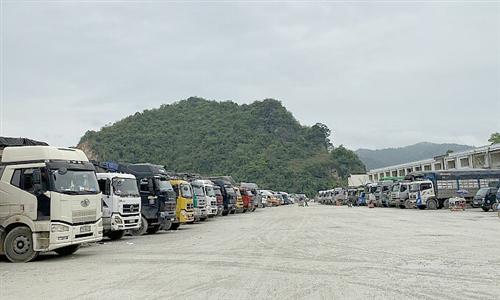Wood processing and export firms need to adapt during pandemic
Wood processing and export firms need to adapt during pandemic
The novel coronavirus (COVID-19) pandemic has had negative impacts on the domestic wooden processing industry, but this is also an opportunity for timber enterprises to review their production and business methods maintain stability at present and drive for sustainable development in the future. 
Deputy Minister of Agriculture and Rural Development Ha Cong Tuan speaks to Vietnam News Agency about the issue
The COVID-19 pandemic has hit wood processing and export enterprises. What are the main difficulties these enterprises are facing at present?
The COVID-19 pandemic has seriously affected the economy in Viet Nam and the world, and the domestic wood processing industry is no exception.
As of April, about 80 per cent of all export orders have been suspended, while enterprises have stopped taking new orders.
Exports to some major markets have mostly stopped, such as the US and EU that accounted for 51 per cent and 9 per cent of total national wood export value in the first quarter of this year, respectively. However, enterprises have met a few orders from other key export markets, including Japan and South Korea.
Meanwhile, China is mainly importing woodchips which are cheap, having a great impact on the total wood export value in the first quarter. Local enterprises need time to resume their exports to this market.
For the domestic market, there are currently two main product lines. One line is products manufactured in traditional trade villages. At present, 70-80 per cent of these products remain unsold due to the pandemic, so the villages have suspended production.
The second is high-class products for major projects, such as hotels and offices. Revenue from this product line has also fallen by 90 per cent over the same period last year.
Besides, in the first quarter of this year, imports of wooden materials and accessories also decreased by 70-80 per cent. Enterprises are mainly using inventories of raw materials and accessories for production at present.
According to a survey of 130 large enterprises, total losses ranged from VND3 trillion (US$128 million) to VND5 trillion. In addition, they also face pressure from credit sources, taxes and social insurance premiums.
What is the Ministry of Agriculture and Rural Development doing to support these enterprises during this difficult time?
About 7 per cent of these enterprises are still operating normally. More than 90 per cent have had to slash operations or suspend production.
The ministry is working closely with these enterprises and commodity associations to help prevent the pandemic while maintaining production.
The ministry has asked the Government and relevant ministries and sectors to support the wood processing industry during the pandemic.
The Government is supporting all industries to maintain production and business, including the wood processing industry.
What specific recommendations has the ministry given to businesses to overcome these difficulties?
The ministry has recommended that enterprises change their production and business models to cope with the pandemic. If they have difficulties in different export markets, they could return to the domestic market. The local market has high demand for wooden products, especially high-end products, so if the enterprises meet the demand, they could maintain production.
Social distancing due to the pandemic has affected the supply chain. Therefore, enterprises could switch to e-commerce channels. The application of IT for trading activities is also a long-term business plan.
Besides that, businesses should focus on workers and share difficulties with them due to the lack of jobs and lower salaries during the pandemic.
The ministry has also assigned the General Department of Forestry to help associations and trade villages resume production after the pandemic ends.
How can the wood processing industry develop in the long term?
The industry is facing a lot of difficulties due to the COVID-19 pandemic, but it has the potential to improve the value chain.
If the pandemic does not prolong and the industry resumes exports to key markets soon, it will be able to reach its export value target of $12 billion this year.
To reach the target, the industry must restructure its export products. At present, the industry must use 25-26 million cu.m of wood to process about 13 million tonnes of woodchips worth of $1.5-1.6 billion. That means the industry has gained a low export value at about 10 per cent of the total from processing 60 per cent of raw material.
Besides that, Viet Nam mainly exports dressing tables, kitchens and bathroom furniture to the US and EU, accounting for 60 per cent of the total export value.
The export value of outdoor furniture and office furniture accounts for only 40 per cent of the total. Therefore, these products have the potential to increase in export value in the future.
At the same time, the industry must restructure the whole chain, from improving varieties of trees to promoting sustainable forest management. It will also implement its commitments to the EU-Viet Nam Voluntary Partnership Agreement on Forest Law Enforcement, Governance and Trade (VPA-FLEGT) to ensure that its exports of timber and wooden products come from legal sources.
The industry needs to strengthen the production chain to reduce dependence on imported materials, especially timber and accessories.
Enterprises should apply and renew technology for production as well as develop online trading. They should also renew their designs to meet the market demand.
They must pay attention to the domestic market worth $3 billion because demand is expected to increase for high-quality wooden products in the future.
On the domestic market, luxury hotels and high-end office buildings are also potential customers for local wood processing enterprises to increase their market shares.





















